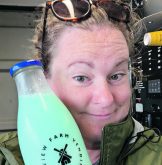Q: I am just sick about this whole thing. Shortly after my son-in-law was discharged from a residential drug and treatment program he went out and got drunk, yet again, just like he always did before we got him into the program.
We thought that he was doing well in his program, and so did the counsellors working there, but something went wrong, either here, there or wherever. My daughter and our grandchildren are once again living on the edge, wondering if Daddy is going to come home at night or if he is to be displaced by that drunken monster haunting the family. What, if anything, can we do about all of this?
Read Also

Powerful solar storm lights up night time sky
Prairie skywatchers have been on high alert the last few nights as spectacular aurora displays have made the night time…
A: I want you to begin to explore this whole thing by understanding that the recovery rate for first-time substance abusers, be they alcoholics or drug users, is pretty low.
I do not have the statistics because I have never seen a study with enough credibility to confidently report their findings, but I can tell you that from my own experience only 25 to 35 percent of people will successfully recover from their addictions the first time they challenge them.
Many people fall off the wagon and start drinking or using almost immediately after they have been discharged from a treatment program and they have to return to the program to get refreshed before going back to their communities to try again.
You do not have to tolerate your son-in-law’s addictions and neither does your daughter. She needs to always make sure that she and the children are safe and if that means going to the extreme and separating from her husband for a while, then perhaps she should do that. But I hope that neither you nor your daughter will give up on her husband.
You have to keep trying to get him back into treatment, into AA groups and into whatever programs you can find to support his drive to sobriety. Somewhere along the way he might be successful and wouldn’t that be wonderful?
Most of the treatment programs with which I am familiar do a remarkable job helping the addicts understand and appreciate the problems their addictions have caused.
They help addicts face up to some of their most terrible moments and encourage them to honestly confront and comfort the many people they have hurt through their addictions.
And that is great. But sometimes we forget that when we are asking addicts to let go of that substance abuse that has been part of their lives, we are in some way asking them to say goodbye to their best friends.
Think about it. What do addicts do when someone they love disappoints them? They turn to their addictions. What do addicts do when life is unusually stressful? They turn to their addictions. What do addicts do when they are feeling lonely? They turn to their addictions.
Addicts turn to their addictions just as you might turn to either your friends or someone in your family to help with their problems.
If your son-in-law is going to successfully beat this thing he needs to find ways of getting the same and even better support from his interpersonal commitments than he was getting from either that bottle of beer or that used hypodermic needle.
Any small thing you can do to help your son-in-law find other ways for dealing with the many glitches in life’s journeys might be momentous in helping him finally recover from that which ails him.














